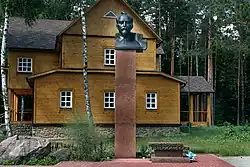| Ahinski manor in Zaliessie | |
|---|---|
Государственное учреждение культуры «Музей-усадьба „Дзержиново“» | |
 | |
| General information | |
| Location | Stowbtsy District, Minsk Region Belarus |
| Coordinates | 53°50′09″N 26°32′30″E / 53.835922°N 26.541684°E |
| Completed | 19th century (rebuilt in 1972) |
| Demolished | 1943 |
| Website | |
| dzerzhinovo.museum.by | |
Dzerzhinovo (Polish: Dzierżynowo; Belarusian: Дзяржынава; Russian: Дзержиново), officially known as Государственное учреждение культуры «Музей-усадьба „Дзержиново“» formerly Oziembłowo - was a small estate on the Usa River, with a total of 180 acres (about 100 ha), including a nobleman's manor with a grange. Felix Dzerzhinsky who founded and headed the first Soviet secret police, the Cheka, was born in the manor. Currently, it lies in the Stowbtsy District, of the Minsk Region, about 3 km west of Petrilovich[1] and 15 km from Ivyanets.[2] The entire Dzerzhinovo complex has been granted the status of a historical and cultural monument of Belarus.[3]
History
Originally the family estate of the Oziembłowskis, then under the name of Oziembłowo. In the 1820s, as a result of the marriage of Antonina Oziembłowska with the homestead nobleman Józef Jan Dzierżyński (1788-1854), it became the property of this couple. Since then, the ancestral estate of the Dzerzhinskys. Inherited by Edmund (1838-1882). For some time, the property was leased to other people (until 1875). In 1877, Feliks Dzerzhinsky was born here. The previous name Oziembłowo, with which it is listed in the Geographical Dictionary was changed by the Dzierżyńskis in the 19th century, probably after the birth of Feliks.[4]
Two of Feliks' brothers died here: Stanisław (killed in July 1917 by Russian soldiers returning from the front, possibly deserters) and Kazimierz (executed by the Germans in August 1943 for participating in the resistance movement). In retaliation for the underground activity, as part of Operation Hermann, the Germans also burned the manor house itself in summer 1943.[5]
The history of the manor museum began in 1963, when the Council of Ministers of the BSSR (Belarusian: Савет Міністраў БССР) declared the Dzerzhinovo manor with the adjacent territory of a total area of 80 ha a natural monument of republican importance. In 1972, a memorial complex was opened in Dzyarzhynsk - a branch of the Ivynetsk Memorial Museum of Dzerzhinsky (founded in 1957).[6]
At the 10th meeting of the Council of Heads of Security Bodies and Special Services of the CIS Member States on 05/25/2001, a decision was made to restore the Dzerzhinovo memorial complex. On February 28, 2002, it was included in the State List of Historical and Cultural Values of the Republic of Belarus. A residential house with an attic and a part of the estate were restored with the financial support of the special services of Russia and Ukraine with Belarusbank involved. On October 7, 2004, the restored memorial complex was opened. The exposition, created in the house-museum of the Dzerzhinsky family, received high praise from the President of Belarus, Aleksandr Lukashenko, heads of delegations participating in the 17th meeting of the Council of Heads of Security Bodies and Special Services of the CIS Member States, and the leadership of the Belarusian secret police. According to the decision of the Minsk Regional Executive Committee from 06/07/2005, the memorial complex under the Staubtsov District Executive Committee has a modern status and name from 04/17/2006. From July 1, 2006, director T. M. Chuiko.
In 2007, the Museum-Mansion "Dzerzhinovo" received an incentive diploma of the FSB Award in the category "Fine Art" for the creation of a high-art exposition dedicated to the life and work of Dzerzhinsky.
References
- ↑ "ПЕТРИЛОВИЧИ - МЕМОРИАЛЬНЫЙ КОМПЛЕКС "ДЗЕРЖИНОВО" (РОДИНА Ф.Э. ДЗЕРЖИНСКОГО)" (in Russian). Retrieved 2023-08-29.
- ↑ "Mapa WIG P33-S43-E Kamień pod Iwieńcem (skala 1:25 000, rok wydania 1938".
- ↑ "Feliks Dzierżyński uczczony na Białorusi" (in Polish). 2004-10-10. Retrieved 2012-07-20.
- ↑ Alwida A. Bajor. "Na tropach bohaterów opowieści Józefa Mackiewicza "Krasnyj pomieszczik"" (in Polish). Retrieved 2009-12-01.
- ↑ Dzierżyński. Miłość i rewolucja (in Polish). Znak Horyzont. 2004. pp. 33–35.
- ↑ "МУЗЕЙ-УСАДЬБА "ДЗЕРЖИНОВО"" (in Russian). Stolbtsy District government. Retrieved 2023-08-29.